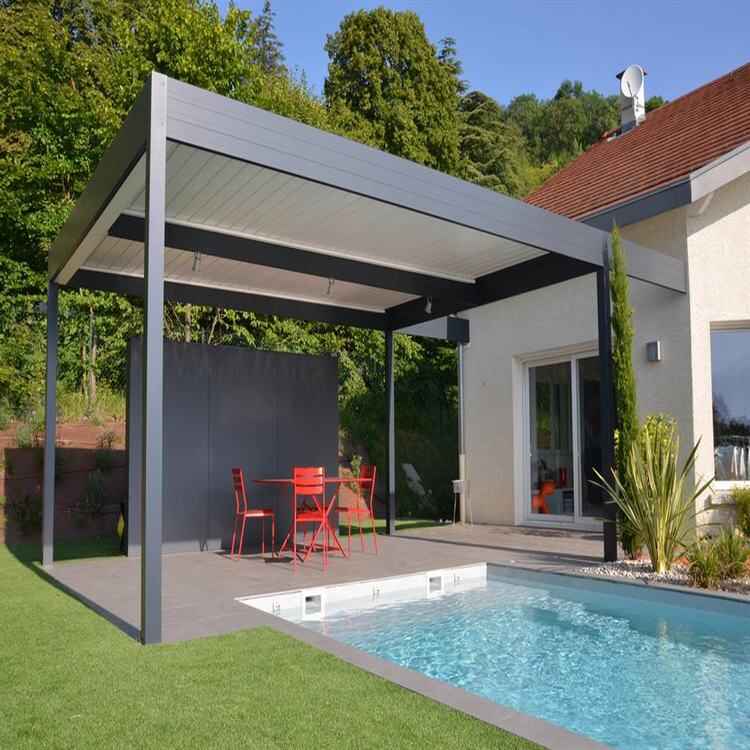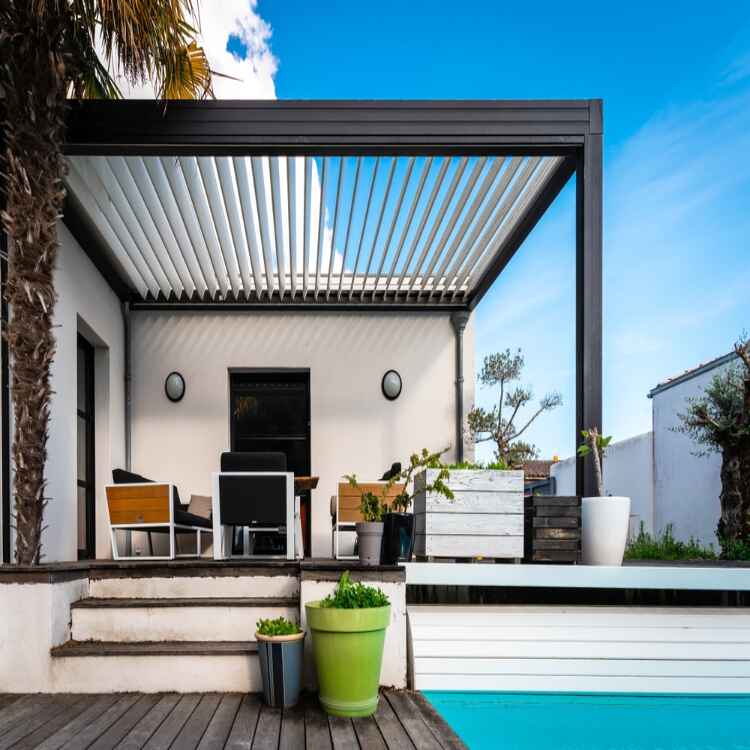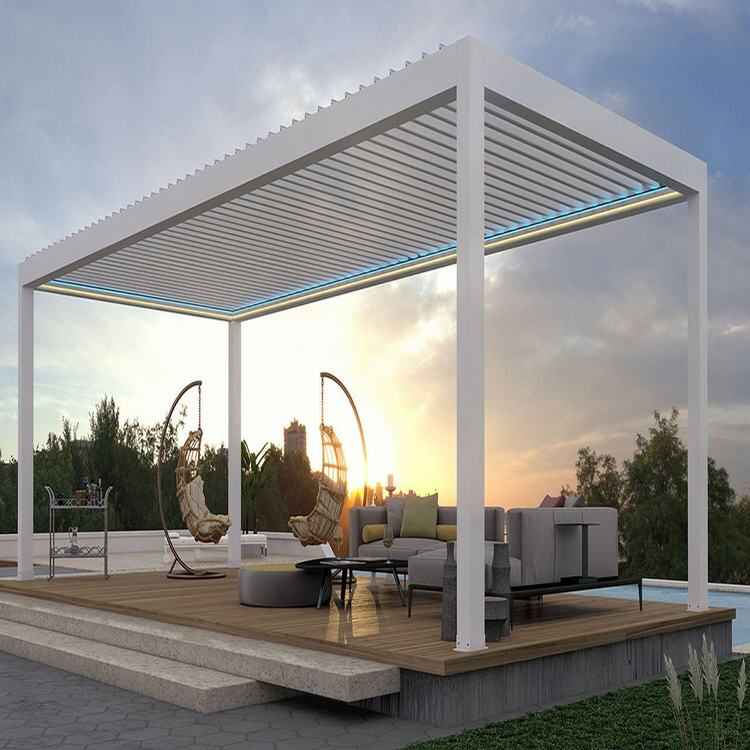Discover premium rolling roofs and bioclimatic systems in Istanbul. Enhance terraces, patios, and outdoor spaces with style, comfort, and durability.
| Products | Size | Price | Material |
|---|---|---|---|
| Pergola | Under 10m² | 110 € | Motorized |
| Awning | Above 20m² | 110 € | Motorized |
| Zip Curtain | 9m² | 900 € | Local Fabric |
| Bioclimatic Pergola (Piston) | Under 20m² | 350 € | Motorized |
| Rolling Roof (Scissor) | Above 25m² | 300 € | Motorized |
| Glass Ceiling | Under 10m² | 250 € | - |
| Winter Garden | Under 10m² | 300 € | Motorized |
| Aluminum Ceiling | Above 20m² | 350 € | Motorized |
| Heat Glass Sliding | Under 10m² | 110 € | - |
| Sliding Glass | Above 10m² | 110 € | - |
| Guillotine Glass | Unit | 65 € | Motorized |
| Double Opening Awning | Above 20m² | 110 € | Motorized |
| Single Carport | - | 6500 € | Motorized |
| Double Carport | - | 8500 € | Motorized |
| Bioclimatic Ceiling | Under 10m² | 350 € | Motorized |
| Terrace Roof Pergola | Under 10m² | 65 € | Motorized |
What is a Rolling Roof?
A rolling roof is an innovative and flexible architectural solution designed to provide both protection and adaptability for outdoor spaces such as terraces, patios, gardens, and commercial areas. Unlike conventional fixed roofing systems, a rolling roof allows users to retract or extend the covering according to their needs, providing full control over exposure to sunlight, rain, wind, and other environmental factors. This functionality is particularly valuable for homeowners who want to enjoy the open air during pleasant weather and seek shelter during inclement conditions without compromising the aesthetics of their property. Rolling roofs are engineered to integrate seamlessly with modern architecture, offering a blend of durability, elegance, and practicality. They are highly sought after for residential spaces, cafes, restaurants, hotels, and other commercial settings where versatile outdoor usage is a priority. By combining high-quality materials, smooth operation, and customizable designs, rolling roofs create an adaptive outdoor environment that enhances comfort and usability throughout the year, making them a cornerstone of contemporary outdoor architecture.
What is a Rolling Roof and What is it Used For?
A rolling roof is not just a protective structure; it is a multifunctional system that transforms ordinary outdoor areas into highly versatile spaces suitable for various activities and weather conditions. Its primary purpose is to provide shelter from sun, rain, and wind, allowing homeowners and businesses to enjoy outdoor environments regardless of the season. In residential settings, it enhances terraces, patios, and balconies by creating comfortable zones for relaxation, dining, or social gatherings. In commercial spaces, rolling roofs are used to extend the usability of seating areas in cafes, restaurants, and event venues, ensuring customers remain comfortable throughout the year. Many modern rolling roofs also incorporate advanced features such as LED lighting, integrated heating, and waterproof fabrics, further increasing usability and luxury. Additionally, rolling roofs contribute to energy efficiency by reducing direct sunlight exposure during hot weather, which can help lower cooling costs. The system’s adaptability, ease of operation, and design integration make it an essential solution for anyone seeking to optimize outdoor spaces for both aesthetic and functional purposes.
What are Rolling Roof Models?
Rolling roofs come in a wide variety of models and designs, each catering to different needs, climates, and architectural styles. The most common types include:
-
Manual Rolling Roofs: Operated by hand using cranks or pulley mechanisms, ideal for smaller or simpler spaces where automation is not necessary.
-
Motorized Rolling Roofs: Electric systems allow effortless extension and retraction through switches, remote controls, or mobile applications, offering convenience for both residential and commercial settings.
-
Bioclimatic Rolling Roofs: Incorporate adjustable slats or lamellas to regulate airflow, light, and temperature, providing environmental control and enhanced comfort while adding a sleek, modern look.
-
Retractable Fabric Roofs: Constructed from durable, waterproof fabrics that roll back smoothly to open the area to fresh air, sunlight, or starlight.
-
Aluminum or Polycarbonate Panels: Provide a more solid, weather-resistant solution, sometimes motorized for ease of use.
Each model varies in terms of material, durability, operational mechanism, and customization options. Users can select the system that best aligns with their climate, space size, design preferences, and functional requirements, ensuring maximum versatility and efficiency.
What are the Features of a Rolling Roof?
The key features of a rolling roof highlight its multifunctional nature and premium design. These include:
-
Weather Resistance: High-quality fabrics, PVC coatings, and structural frames protect against rain, snow, wind, and UV exposure.
-
Motorization: Automated systems provide smooth operation through remote control, mobile apps, or integrated smart-home systems.
-
Customization: Diverse color options, fabric types, and frame designs allow seamless integration with architectural styles.
-
Energy Efficiency: Certain models minimize solar heat gain, reducing cooling demands during summer months.
-
Lighting Integration: LED strips and ambient lighting can be incorporated to enhance nighttime usability.
-
Durability and Safety: Systems are tested against heavy wind, snow loads, and UV degradation for long-term reliability.
-
Low Maintenance: Advanced materials and protective coatings ensure minimal upkeep while maintaining performance.
These attributes collectively make rolling roofs a stylish, functional, and reliable solution for a broad range of indoor-outdoor architectural applications.
What are the Differences Between a Bioclimatic and a Rolling Roof?
While standard rolling roofs are primarily designed to provide protection and flexibility, bioclimatic rolling roofs take outdoor comfort and environmental control to a new level. Key differences include:
-
Slat Mechanism: Bioclimatic systems use adjustable lamellas to manage sunlight and airflow, unlike fixed or fabric-only rolling roofs.
-
Climate Optimization: These roofs actively regulate temperature and ventilation, improving comfort and potentially lowering energy consumption.
-
Automation: Rain, wind, and sunlight sensors allow the roof to adjust automatically for optimal conditions.
-
Modern Aesthetics: Sleek, architectural designs elevate the visual appeal of outdoor areas.
-
Cost Factor: Due to advanced technology and materials, bioclimatic roofs are generally more expensive than traditional rolling roofs.
In essence, a bioclimatic rolling roof combines functionality with intelligent environmental responsiveness, offering a superior solution for premium outdoor living and commercial applications.
Is It Advantageous to Have a Rolling Roof Built?
Investing in a rolling roof provides multiple advantages for both residential and commercial properties. It allows year-round outdoor usability, offering protection against sun, rain, and wind while creating a comfortable and visually appealing environment. Rolling roofs enhance property value by adding a modern architectural element and functional outdoor space. They can reduce energy consumption through temperature regulation and offer automation features for effortless operation. The high level of customization in materials, colors, fabrics, and structures ensures compatibility with various design aesthetics. Ultimately, rolling roofs transform ordinary outdoor spaces into versatile, elegant, and practical areas, combining comfort, durability, and design excellence.
What is a Bioclimatic Rolling Roof System?
A bioclimatic rolling roof system represents the forefront of modern outdoor roofing technology, combining aesthetic appeal with intelligent environmental control. Unlike traditional rolling roofs that only provide coverage, bioclimatic systems actively manage airflow, sunlight, and temperature through adjustable slats or lamellas. Automated sensors detect weather changes, such as rain, wind, or intense sunlight, and adjust the roof accordingly, creating an ideal outdoor climate at all times. These systems can significantly reduce reliance on air conditioning or heating by optimizing energy efficiency and natural ventilation. Designed for both residential and commercial settings, bioclimatic roofs integrate seamlessly with smart-home technologies, LED lighting, and optional heating elements, making terraces, patios, and outdoor dining areas functional year-round. Their minimalist, modern designs also contribute to property value, providing a stylish architectural feature that combines comfort, technology, and sustainability.
Rolling Roof… But Which Brand? / Highlight Our Rolling Roof Company
Selecting the right rolling roof brand is crucial for long-term performance, reliability, and design compatibility. A reputable brand ensures that materials, motorization systems, and structural components meet rigorous quality standards, providing durability against wind, rain, UV exposure, and temperature fluctuations. Our Istanbul-based company specializes in designing and installing custom rolling roof systems tailored to residential, commercial, and hospitality spaces. We provide expert guidance on choosing materials, fabrics, and structural options to complement existing architecture while offering state-of-the-art motorized and bioclimatic systems. By choosing a trusted brand, clients gain access to warranties, professional installation, and responsive after-sales service, ensuring that the rolling roof remains functional, safe, and visually appealing for years. Quality and customization are critical, making brand selection an essential step in maximizing both comfort and investment value.
Rolling Roof System Manufacturers in Turkey
Turkey has emerged as a global hub for high-quality rolling roof production, offering a wide array of systems that meet diverse functional and aesthetic requirements. Turkish manufacturers specialize in both manual and motorized rolling roofs, as well as advanced bioclimatic models featuring adjustable slats, smart sensors, and energy-efficient materials. These systems are built with durable fabrics, PVC coatings, aluminum, or polycarbonate frames designed to withstand harsh weather conditions while maintaining aesthetic appeal. Working with a trusted manufacturer ensures reliable installation, high-quality materials, and excellent customer support. Many companies also provide tailored solutions to meet architectural preferences, outdoor space dimensions, and climate considerations, making Turkey a key destination for sourcing innovative and durable rolling roof systems.
Rolling Roof… But Which One Should I Choose?
Choosing the right rolling roof requires careful consideration of multiple factors, including space, climate, intended usage, design preferences, and budget. For small terraces or balconies, manual systems may provide a cost-effective solution, while larger terraces benefit from motorized or bioclimatic roofs that offer automation and advanced environmental control. Areas with heavy rain, snow, or intense sunlight require materials that ensure durability, waterproofing, and UV resistance. Design compatibility is also critical; the roof should harmonize with the architectural style and overall aesthetic of the property. Automation features, such as remote control, sensor integration, and smart-home connectivity, can significantly enhance convenience and usability. By evaluating these elements, users can select a rolling roof system that maximizes comfort, functionality, and long-term satisfaction, ensuring the outdoor area remains practical, safe, and visually appealing.
Is a Rolling Roof Waterproof?
Modern rolling roofs are engineered to provide excellent waterproofing and protect outdoor areas from rain and moisture. High-quality systems use PVC-coated fabrics, durable aluminum frames, or polycarbonate panels to prevent water leakage. In addition, roofs often feature sloped designs, integrated drainage channels, and tight seam construction to guide rainwater away from the covered area. While some older or low-quality models may experience minor seepage, premium rolling roofs guarantee near-complete water resistance, ensuring that terraces, patios, swimming pool areas, and commercial outdoor spaces remain dry even during heavy rainfall. Combined with wind and UV protection, a waterproof rolling roof enhances both comfort and durability, making it a reliable year-round outdoor solution.
Rolling Roof Manufacturers… But Which One? Highlight Us as an Istanbul Company
Choosing the right rolling roof manufacturer is critical for durability, functionality, and post-installation support. Our Istanbul-based company specializes in high-quality, fully customizable rolling roof systems designed for homes, cafes, restaurants, hotels, and other commercial applications. By focusing on premium materials, precise engineering, and expert installation, we ensure that every system is not only aesthetically pleasing but also highly reliable and long-lasting. Clients benefit from warranty support, professional maintenance, and tailored solutions that fit the architectural style, climate conditions, and usage requirements of their outdoor spaces. Selecting a trusted local manufacturer guarantees prompt service, technical expertise, and peace of mind, making the investment both safe and rewarding.
What are the Technical Features of a Rolling Roof?
Rolling roofs are equipped with advanced technical features that combine modern design, convenience, and safety. Motorized systems allow automatic extension and retraction via remote control or smartphone integration, providing effortless operation. High-strength materials, such as aluminum frames and reinforced fabrics, ensure wind, UV, and rain resistance. Waterproofing is achieved through PVC-coated fabrics, precise seam construction, and integrated drainage systems. Durability is tested under extreme snow loads, strong wind pressure, and prolonged sun exposure. Rolling roofs also offer customization options in terms of size, color, and fabric choice, allowing seamless integration with architectural designs. Optional accessories include LED lighting, heating systems, and smart-home connectivity. Safety mechanisms, such as obstacle sensors, ensure that the roof stops automatically if an obstruction is detected, protecting both users and the system. These technical features make rolling roofs highly reliable, efficient, and user-friendly, suitable for both residential and commercial applications.
Is It Advantageous to Have a Rolling Roof Built?
Installing a rolling roof offers substantial advantages for both residential and commercial properties. It creates a versatile outdoor space that can be used in all weather conditions, extending living or commercial areas. The roof provides protection against sun, rain, and wind while enhancing comfort and usability. Rolling roofs can improve energy efficiency by reducing heat exposure in summer, lowering cooling costs. Their customizable design allows integration with existing architecture, while motorized or sensor-enabled options provide effortless operation. Additionally, installing a rolling roof can enhance property value, combining practical functionality with aesthetic appeal. In short, rolling roofs offer a long-term solution for comfort, style, and outdoor usability, transforming ordinary terraces, patios, and commercial areas into elegant, adaptable spaces.
Why Should You Have a Rolling Roof System Installed?
A rolling roof system installation guarantees protection, comfort, and visual appeal for any outdoor area. It ensures shelter from unpredictable weather conditions, including sun, rain, and wind, making terraces, patios, and commercial outdoor zones usable year-round. Modern rolling roof systems enhance aesthetics with sleek, contemporary designs that integrate seamlessly with buildings. High-quality materials ensure long-term durability, while smart features like automation, sensor response, and lighting integration add convenience and functionality. Rolling roofs are adaptable for both small and large spaces, transforming ordinary outdoor areas into functional, stylish, and comfortable environments suitable for private homes, commercial venues, or hospitality settings.
What are the Usage Areas of a Rolling Roof?
Rolling roofs are extremely versatile, suitable for a wide range of applications across residential, commercial, and institutional environments:
-
Homes & Villas: Cover terraces, balconies, and outdoor seating areas while maintaining elegance.
-
Cafes & Restaurants: Extend outdoor seating, ensuring comfort during rain or intense sun.
-
Workplaces: Provide sheltered outdoor zones for breaks, meetings, or relaxation.
-
Wedding Venues & Event Spaces: Protect outdoor areas for ceremonies and receptions.
-
Pools: Keep poolside areas dry, safe, and usable in varying weather conditions.
-
Hotels & Resorts: Enhance guest experiences by offering covered terraces and dining areas.
-
Terraces & Gardens: Transform open areas into functional and attractive spaces.
-
Hospitals & Healthcare Facilities: Shelter waiting areas, therapy zones, or outdoor lounges for staff and patients.
Each usage ensures that outdoor spaces remain functional, aesthetically appealing, and comfortable throughout the year, maximizing the return on investment.
What are the Fabric Prices of Rolling Roofs Per M²?
The fabric prices of rolling roofs per square meter vary based on material quality, waterproofing, UV protection, and automation features. Standard motorized or manual fabrics typically start around €300 per m², while premium waterproof, UV-resistant, or bioclimatic fabrics may exceed this cost due to advanced features and durability. Additional costs depend on fabric type, installation complexity, and optional accessories like LED lighting, heating, or smart integration. Selecting high-quality fabrics ensures long-term performance, weather resistance, and visual appeal, making it a critical factor in the overall investment in a rolling roof system.
Frequently Asked Questions About Rolling Roof Systems
-
Can a rolling roof withstand heavy rain? Yes, premium systems with waterproof fabrics and integrated drainage keep areas dry even during storms.
-
Are motorized rolling roofs safe? Absolutely. Modern systems include obstacle sensors and automatic stops to prevent accidents.
-
Do rolling roofs require maintenance? Minimal maintenance is needed; periodic cleaning of the frame and fabric ensures longevity.
-
Can a rolling roof be customized? Yes, users can choose sizes, colors, fabrics, and accessories to match their design needs.
-
Is it possible to integrate lighting or heating? Most modern systems allow optional LED lighting and electric or infrared heaters.
-
Are bioclimatic rolling roofs better than standard ones? Bioclimatic models offer advanced airflow, sunlight control, and energy efficiency, making them ideal for premium outdoor spaces.







